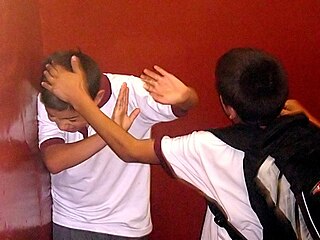Related Research Articles

Aggression is a behavior aimed at opposing or attacking something or someone. Though often done with the intent to cause harm, it can be channeled into creative and practical outlets for some. It may occur either reactively or without provocation. In humans, aggression can be caused by various triggers. For example, built-up frustration due to blocked goals or perceived disrespect. Human aggression can be classified into direct and indirect aggression; whilst the former is characterized by physical or verbal behavior intended to cause harm to someone, the latter is characterized by behavior intended to harm the social relations of an individual or group.

Conduct disorder (CD) is a mental disorder diagnosed in childhood or adolescence that presents itself through a repetitive and persistent pattern of behavior that includes theft, lies, physical violence that may lead to destruction, and reckless breaking of rules, in which the basic rights of others or major age-appropriate norms are violated. These behaviors are often referred to as "antisocial behaviors", and is often seen as the precursor to antisocial personality disorder; however, the latter, by definition, cannot be diagnosed until the individual is 18 years old. Conduct disorder may result from parental rejection and neglect and can be treated with family therapy, as well as behavioral modifications and pharmacotherapy. Conduct disorder is estimated to affect 51.1 million people globally as of 2013.

In sociology, a peer group is both a social group and a primary group of people who have similar interests (homophily), age, background, or social status. The members of this group are likely to influence the person's beliefs and behaviour.
Mobbing, as a sociological term, refers either to bullying in any context, or specifically to that within the workplace, especially when perpetrated by a group rather than an individual.

Bullying is the use of force, coercion, hurtful teasing or threat, to abuse, aggressively dominate or intimidate. The behavior is often repeated and habitual. One essential prerequisite is the perception of an imbalance of physical or social power. This imbalance distinguishes bullying from conflict. Bullying is a subcategory of aggressive behavior characterized by hostile intent, imbalance of power and repetition over a period of time.

The Bobo doll experiment is the collective name for a series of experiments performed by psychologist Albert Bandura to test his social learning theory. Between 1961 and 1963, he studied children's behaviour after watching an adult model act aggressively towards a Bobo doll. The most notable variation of the experiment measured the children's behavior after seeing the adult model rewarded, punished, or experience no consequence for physically abusing the Bobo doll.
School violence includes violence between school students as well as attacks by students on school staff and attacks by school staff on students. It encompasses physical violence, including student-on-student fighting, corporal punishment; psychological violence such as verbal abuse, and sexual violence, including rape and sexual harassment. It includes many forms of bullying and carrying weapons to school. The one or more perpetrators typically have more physical, social, and/or psychological power than the victim. It is a widely accepted serious societal problem in recent decades in many countries, especially where weapons such as guns or knives are involved.
Relational aggression, alternative aggression, or relational bullying is a type of aggression in which harm is caused by damaging someone's relationships or social status.

School bullying, like bullying outside the school context, refers to one or more perpetrators who have greater physical strength or more social power than their victim and who repeatedly act aggressively toward their victim. Bullying can be verbal or physical. Bullying, with its ongoing character, is distinct from one-off types of peer conflict. Different types of school bullying include ongoing physical, emotional, and/or verbal aggression. Cyberbullying and sexual bullying are also types of bullying. Bullying even exists in higher education. There are warning signs that suggest that a child is being bullied, a child is acting as a bully, or a child has witnessed bullying at school.
Peer victimization is the experience among children of being a target of the aggressive behavior of other children, who are not siblings and not necessarily age-mates.

School Psychology International is a bimonthly peer-reviewed academic journal that highlights the concerns of those who provide quality mental health, educational, therapeutic, and support services to schools and their communities throughout the world. It offers peer-reviewed articles reflecting high quality academic research in the field as well as examples of proven best practice. This journal is a member of the Committee on Publication Ethics (COPE). The journal was established in 1979 and is currently published by SAGE Publications.
Professor Peter K Smith is a developmental psychologist with a particular interest in children’s social development.
Darcia Narvaez is a Professor of Psychology Emerita at the University of Notre Dame who has written extensively on issues of character, moral development, and human flourishing.

Tina Malti is a Canadian-German child psychologist of Palestinian descent. She currently holds an Alexander von Humboldt Professorship for Early Child Development and Health as the first child psychologist and female psychologist in the award's history. She directs the Alexander von Humboldt Research Group for Child Development as research chair at Leipzig University. She is also a professor of psychology at the University of Toronto and founding director of the Centre for Child Development, Mental Health, and Policy at the University of Toronto.
Nicki Rae Crick was a psychologist and professor of child development and family studies known internationally for her research on relational aggression, defined as the use of relationships as agents of harm. At the time of her death, she held the position of Distinguished McKnight University Professor and Irving B. Harris Professor of Child Psychology at the Institute of Child Development, University of Minnesota.
Deborah M. Capaldi is a developmental psychologist known for her research on at-risk male youth and the intergenerational transmission of substance use, antisocial behavior, intimate partner violence, and child abuse. She is a senior scientist at the Oregon Social Learning Center. Her current projects focus on child exposure to family violence and parenting practices of at-risk parents.
Wendy Marion Craig is a Canadian clinical-developmental psychologist known for her research and advocacy in the field of childhood bullying. She is a professor in the Department of Psychology at Queen's University at Kingston in Ontario, Canada.
Anna Costanza Baldry was an Italian social psychologist and criminologist. She was a professor at Università degli Studi della Campania Luigi Vanvitelli. An expert on issues related to violence against women and children, Baldry consulted with such organizations as the United Nations and NATO. For her contributions to society, she was awarded the Order of Merit of the Italian Republic.
Christina Salmivalli is a Finnish professor of psychology and the deputy head of the INVEST research flagship at the University of Turku in Finland. Salmivalli is recognized as an expert on peer relations and school bullying.
Corinna Jenkins Tucker is an American Human Development and Family Studies researcher most known for her research on sibling conflict, aggression, and abuse. She is the Director of the Sibling Aggression and Abuse Research Advocacy Initiative (SAARA), for the Crimes Against Children Research Center at the University of New Hampshire.
References
- 1 2 3 "Debra J. Pepler". York University. Retrieved 2019-11-18.
- ↑ "Pepler, Debra J." WorldCat Identities. Retrieved 2017-01-29.
- ↑ "Distinguished Research Professors". York University. Retrieved 2017-01-29.
- 1 2 "York Professor Debra Pepler honoured for her contributions to psychology – YFile". yfile.news.yorku.ca. 19 June 2015. Retrieved 2019-11-18.
- ↑ "Bullying expert turns her eye to Halifax board". The Globe & Mail. 2013-04-18. Retrieved 2019-11-18.
- ↑ "Debra Pepler - Google Scholar Citations". scholar.google.ca. Retrieved 2019-11-20.
- 1 2 "York researchers are helping to change the way we think about bullying, aggression and violence". York University. 2017-01-09. Archived from the original on 2019-11-17. Retrieved 2019-11-18.
- ↑ Pepler, Debra J.; Craig, Wendy M. (1995). "A peek behind the fence: Naturalistic observations of aggressive children with remote audiovisual recording". Developmental Psychology. 31 (4): 548–553. doi:10.1037/0012-1649.31.4.548.
- ↑ Craig, Wendy M.; Pepler, Debra; Atlas, Rona (2000). "Observations of Bullying in the Playground and in the Classroom". School Psychology International. 21: 22–36. doi:10.1177/0143034300211002. S2CID 146140435.
- ↑ Mahady Wilton, Melissa M.; Craig, Wendy M.; Pepler, Debra J. (2000). "Emotional Regulation and Display in Classroom Victims of Bullying: Characteristic Expressions of Affect, Coping Styles and Relevant Contextual Factors". Social Development. 9 (2): 226–245. doi:10.1111/1467-9507.00121.
- ↑ O'Connell, Paul; Pepler, Debra; Craig, Wendy (1999). "Peer involvement in bullying: Insights and challenges for intervention". Journal of Adolescence. 22 (4): 437–452. doi:10.1006/jado.1999.0238. PMID 10469508.
- ↑ "York University professor to appear today on Oprah to share expertise/advice on bullying with 20 million viewers". York University. 1997-11-14. Retrieved 2019-11-24.
- ↑ "About PREVNet - Canada's authority on bullying". PREVNet. Retrieved 2019-11-18.
- ↑ The Canadian Press. "Full list of new Order of Canada recipients". CBC. Retrieved 2019-12-31.